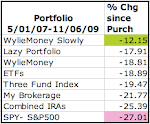Lots of financial sites and blogs post articles offering advice about what records to keep in general: bankrate, soundmoneytips, realsimple, even the IRS has made an attempt.
As is often the case, Morningstar has one of the best explanations for why this matters when it comes to investment records.
I keep every monthly statement from my brokerage and have a file over 2 1/2 inches deep to show for it. I wish this was an indicator of massive wealth, but really it is just a symptom of reinvested dividends.

If you put $500 in a growth and income fund and reinvest the dividends and capital gains, each payment- in cents, dollars, whatever, is a transaction on the statement. And at the end of the year, you pay income taxes on those payments, even though they are (re)invested, and not cash in your pocketses. So if you do not have a ton of money (yet!), but still want to diversify broadly and put a small amount of money in a number of funds instead of just piling it all into one, your statements get long.
Some of the new retirement funds like Vanguard Target Retirement 2050 are actually a collection of funds, so you can put all or some of your money in one of these, even if you do not plan to save it until retirement, and diversify that way, but I digress
Some brokerages are no longer sending paper statements automatically and actually charging investors for this 'privilege.' Here is Ameritrade, disclosing its fees:
 So if you only get electronic statements, or opt to get electronic only, you have to keep those too. And back them up!
So if you only get electronic statements, or opt to get electronic only, you have to keep those too. And back them up!I finally got my 3rd and 4th brokerage account tax statements. One of these adjustments changed how $22.46 was allocated for tax purposes. I waited a month and a half to file my taxes because of how $22... good grief.
So anyway, I sold a fund last year and I knew how much I originally invested, and Etrade does a good job of keeping track of funds that have automatically reinvested since they bought my account from my previous brokerage. My old records, however, did not convert to my Etrade account so I had to go back through my paper records starting in 2000 when I bought the fund to calculate my actual basis. This took me about 3 minutes to do because I had all my records in order and this changed my basis by a couple of hundred dollars which lowered my tax bill enough to buy a decent bottle of wine! Or, if I shop at Trader Joe's, 3 or 4 decent bottles of wine!
So the lesson here is that you should keep your statements, paper or electronic, because your brokerage may be bought by a competing brokerage, or it may raise its fees and you may transfer your account to a better brokerage and all your details may not transfer over. And unless you want to pay the tax man (or woman) for the same profits twice, you'll want to be able to add up your actual basis, not just the amount you originally invested and having your statements handy and organized makes this pretty easy.



No comments:
Post a Comment